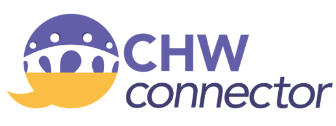NACHW Reports
Welcome to the NACHW reports page! Here you will find an archive of reports NACHW has authored or co-authored.
As we work towards advancing our mission of unifying CHWs across geography, ethnicity, sector and experience, NACHW has developed a strategic plan to prioritize our efforts, align with our members and shareholders’ goals, and effectively allocate resources. Reports are thus sorted according to their alignment with particular parts of our strategic plan priorities. These are:
- Priority 1: Training, Professional Development & Workforce Development
- Priority 2: Policymaking & Advocacy
- Priority 3: Professionalization and Unified Identity for CHWs nationally
- Priority 4: CHW Networks, Associations, and Community-Based Organizations
- Priority 5: Racial and Health Equity
- Priority 6: Organizational Sustainability
View NACHW’s Strategic Plan here!
NOTE: For further reports, policies, and resources by partners and other trusted sources, please visit the rest of our site. Other pages include the COVID-19 Resources page, our Policy Page, and the Document Resource Center.
Table of Contents
Workforce Development
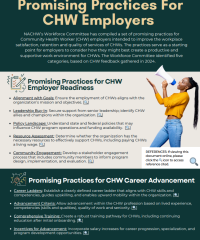
Promising Practices for CHW Employers Two Pager
Authors: NACHW Workforce Development Committee
NACHW’s Workforce Committee has compiled a set of promising practices for
Community Health Worker (CHW) employers intended to improve the workplace satisfaction, retention and quality of services of CHWs. The practices serve as a starting point for employers to consider how they might best create a productive and supportive work environment for CHWs. The Workforce Committee identified five categories, based on CHW feedback gathered in 2024.
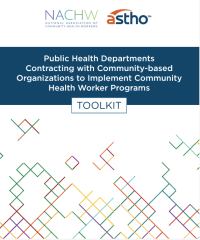
TOOLKIT: Public Health Departments Contracting with Community-based Organizations to Implement Community Health Worker Programs
Author: NACHW and ASTHO
This toolkit, developed by the National Association of Community Health Workers (NACHW) in partnership with the Association of State and Territorial Health Officials (ASTHO), will provide tips for hiring, training, and building CHW career pathways through your contract.
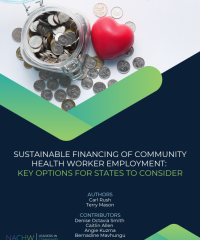
Sustainable Financing of Community Health Workers Employment
Author: Carl Rush
Contributors: Denise Octavia Smith, Caitlin Allen, Bernadine Mavhungu
This report summarizes approaches to financing programs engaging and supporting CHWs, which have been proposed by multiple organizations and research studies from 2001 to the present.
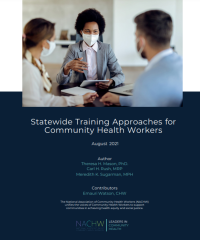
Statewide Training Approaches for Community Health Workers
Author: Theresa H. Mason, Carl H. Rush, Meredith K. Sugarman
Contributors: Emauri Watson, CHW
This report provides examples of the use of the NACHW CHW Document Resource Center by investigating the topic of setting standards for statewide core training for community health workers.
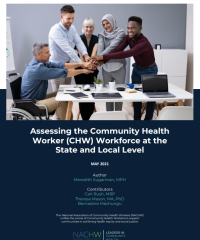
Assessing the Community Health Worker (CHW) Workforce at the State and Local Level
Author: Meredith Sugarman
Contributors: Carl Rush, Theresa Mason, Bernadine Mavhungu
This report provides an example of the use of the NACHW CHW Document Resource Center by describing current efforts and potential support available to state and local health departments, CHW professional organizations, and other stakeholders to measure and assess the CHW workforce.
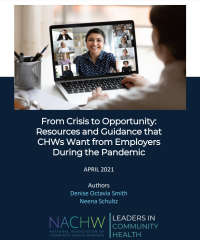
From Crisis to Opportunity: Resources and Guidance that CHWs Want from Employers During the Pandemic
Authors: Denise Octavia Smith, Neena Schultz
This report summarizes the results of a survey that collected CHW responses over three weeks in June 2020 to understand the needs of CHWs and how employers can best support CHWs to protect themselves, provide services safely and adapt services to the changing environment.
Policymaking & Advocacy
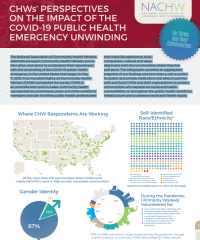
CHWs’ Perspectives on the Impact of the COVID-19 Public Health Emergency Unwinding
The National Association of Community Health Workers (NACHW) surveyed Community Health Workers across the nation and sector to understand their experiences with the unwinding of the COVID-19 public health emergency in the United States that began in May 11, 2023. Four-hundred eighty-six Community Health Workers (CHWs) completed the survey.
CHWs is an umbrella term and includes community healthrepresentatives, promotores, peers and other workforce members who are frontline public health professionals that share life experience, trust, compassion, cultural and value alignment with the communities where they live and serve. This infographic provides an aggregated snapshot of our findings and promotes a call to action for public and private institutions and allies to partner with and fund CHWs and their organizations to protect communities who experience social and health vulnerabilities, to strengthen the public health workforce infrastructure and to advance racial and health equity.
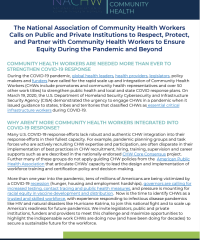
NACHW Policy Platform
Author: NACHW
This document is an important tool to promote national professional identity, leadership and capacity of CHWs and our Associations. It centers many of the policies and best practices that are already nationally endorsed within our field and can be applied to COVID-19 response efforts as well as long term policy development.
Este documento es una herramienta importante para promover la identidad profesional nacional, el liderazgo y la capacidad de los CHW y nuestras Asociaciones. Centra muchas de las políticas y mejores prácticas que ya están respaldadas a nivel nacional dentro de nuestro campo y se pueden aplicar a los esfuerzos de respuesta a COVID-19, así como al desarrollo de políticas a largo plazo.
Unified Identity for CHWs
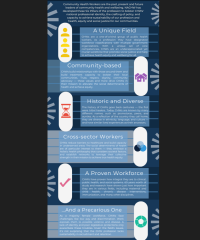
The Six Pillars of Community Health Workers
Over many decades, CHWs, CHRs, Promotoras and other members of our community-based, frontline workforce have advocated and organized to articulate the CHW identity. Yet CHWs’ identities, origins and capacities are still not well understood in the U.S. – resulting in strategies, policies and programs that often do not respect, protect or authentically partner with us.
NACHW, in partnership with CHWs, CHW Networks and allies across the country have developed the Six Pillars of Community Health Workers – to communicate clearly and succinctly who we are, where we are, what we do, and our capacity and needs for sustainability.
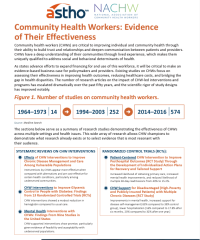
Community Health Workers: Evidence of Their Effectiveness
Author: NACHW and ASTHO
Existing studies on CHWs focus on assessing their effectiveness in improving health outcomes, reducing healthcare costs, and bridging the gap in health disparities. The number of research articles on the impact of CHW-led interventions and programs has escalated dramatically over the past fifty years, and the scientific rigor of study designs has improved notably.
CHW Networks and Organizations
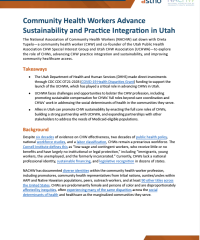
Community Health Workers Advance Sustainability and Practice Integration in Utah
Author: NACHW and ASTHO
The National Association of Community Health Workers (NACHW) sat down with Oreta Tupelo—a community health worker (CHW) and co-founder of the Utah Public Health Association CHW Special Interest Group and Utah CHW Association (UCHWA)—to explore the role of CHWs, advancing CHW practice integration and sustainability, and improving community healthcare access.
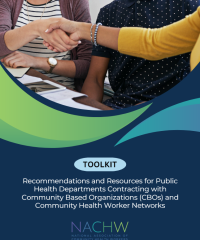
TOOLKIT: Recommendations and Resources for Public Health Departments Contracting with Community Based Organizations (CBOs) and Community Health Worker Networks
This toolkit was developed by NACHW as a resource to support Public Health Departments to equitably build relationships and contract with community-based organizations and Community Health Worker Networks.

NACHW 2023 Data Report – Insights on CHW Network Partnerships, Expertise, and Support Needs for Sustainability
This report summarizes seven key takeaways drawn from the NACHW 2023 National CHW Network Survey that describe challenges and opportunities to sustain these unique and critical organizations. Policymakers and health departments, health systems, philanthropic organizations, and private payers, can gain knowledge about CHW Networks that can inform their future public health initiatives, partnerships, policies, and investments.
Racial and Health Equity
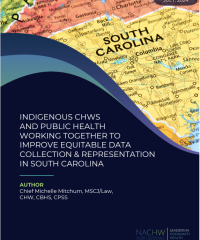
Brief: Indigenous CHWs and Public Health Working Together to Improve Equitable Data Collection and Representation in South Carolina
Author: Chief Michelle Mitchum, MSCJ/Law, CHW, CBHS, CPSS
Failure to document Indigenous People is “paper genocide”, and failing to publish existing Indigenous health data is akin to pseudo-erasing an entire population. “Invisible No More” is a national Indigenous movement in many areas. Pine Hill Indian Tribe, through its nonprofit business aims, has developed training opportunities and pathways to launch Indigenous Public Health awareness, bridge gaps, and created a culturally significant Indigenous Community Health Worker model to meet the unique needs of the Indigenous and nonIndigenous people. Our goal, specifically in rural Indian communities, is to meet health needs and bring to light Indigenous health data.
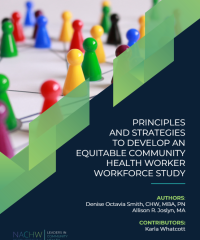
HOW-TO: Principles and Strategies to Develop an Equitable Community Health Worker Workforce Study
Author: Denise Octavia Smith, Allison R. Joslyn
Contributors: Karla Whatcott
The Principles and Strategies to Develop an Equitable Community Health Worker Workforce Study is a guidance document developed by NACHW with Community Health Worker (CHW) and Ally (non-CHW) experts.

Hunger, Nutrition and Health for CHWs and their Communities is a Priority for NACHW: How About You?
Authors: Denise Smith, Allison Joslyn
Access to nutritious and affordable food should be a human right – but it is not. COVID-19 resulted in more than 53 million people seeking food assistance in pantries and soup kitchens. Long before COVID-19 disrupted supply chains, closed restaurants, and placed grocery store, factory and farm workers at increased risk for infection, children and adults across the globe were going hungry.
Wars, famines, and natural disasters rightly command high profile responses for food and water delivery, but what about the hunger that is hidden in plain sight on every continent every day?
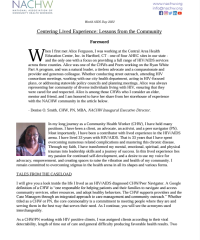
Centering Lived Experience: Lessons from the Community | World AIDS Day 2022
Author: Alice Ferguson, Peer Navigator, HRA Wellness Resource Center
“In my long journey as a Community Health Worker (CHW), I have held many positions. I have been a client, an advocate, an activist, and a peer navigator (PN). Most importantly, I have been a contributor with lived experience in the HIV/AIDS arena…In this lived experience lies my passion for continued self-development, and a desire to use my voice for advocacy, empowerment, and creating spaces to raise the vibration and health of my community. I remain committed to overcoming stigmas in the health arena in all its shapes and various forms.”
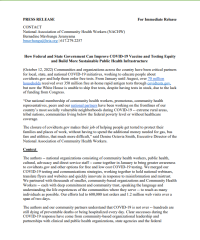
How Federal and State Government Can Improve COVID-19 Vaccine and Testing Equity and Build More Sustainable Public Health Infrastructure
Author: NACHW et. al.
The authors — national organizations consisting of community health workers, public health, cultural, advocacy and direct service staff — came together in January 2022 to bring greater awareness to covidtests.gov and other options for free and low cost COVID-19 testing. We merged our COVID-19 testing and communications strategies, working together to hold national webinars, translate flyers and websites and quickly innovate in response to misinformation and mistrust. We partnered with thousands of smaller, community-based organizations and Community Health Workers — each with deep commitment and community trust, speaking the language and understanding the life experiences of the communities where they serve — to reach as many individuals as possible. Our efforts led to 600,000 test orders and 1.2 million web visits over a span of two days.
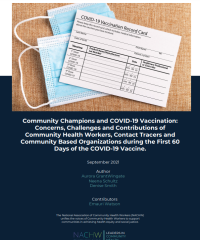
Community Champions and COVID-19 Vaccination
Author: Aurora GrantWingate, Neena Schultz, Denise Smith
Contributors: Emauri Watson
This report provides a snapshot of respondent perspectives from individual, community and system-levels, as well as challenges, bright spots and recommendations in vaccine distribution from 192 self-identified community health workers, contact tracers and community and organizational leaders.

An Environmental Scan to Inform Community Health Worker Strategies within the Morehouse National COVID-19 Resiliency Network
Authors: Jane Berry, Aurora Grant-Wingate, Denise Smith
Contributors: Bernadine Jeranyama
An Environmental Scan to Inform Community Health Worker Strategies within the Morehouse National COVID-19 Resiliency Network was developed by the National Association of Community Health Workers (NACHW) and a consultant from the Community Health Acceleration Partnership (CHAP) to examine key factors within the United States landscape that create challenges or opportunities to integrate the CHW workforce into COVID-19 responses.

